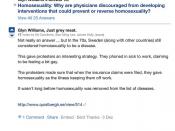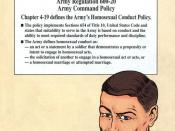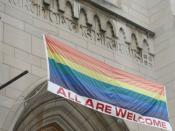After spending sixteen years associated with the military and the rules that govern the military, it's easy to see why this issue causes so much debate and conflict. My mother and stepfather are currently active duty. While conducting research on this issue I interviewed both of them. They had different views on the subject. As I continued to research the issue, I continued to see where the debate of what's best for the military could be backtracked to whom was telling the story.
Many people confuse the law and the policy about "Gays in the Military." Among other things, the law states, "there is not a constitutional right to serve in the armed forces." Living conditions are often "spartan, primitive, and characterized by forced intimacy with little or no privacy," and there are "numerous restrictions on personal behavior that would not be acceptable in civilian life."
In 1993 Congress passed the law (P.L.
103-160, Title 10, Sect. 654) under the Bush administration that further states that military standards of conduct apply at all times, on-duty or off-duty. Absent extenuating circumstances, the statute presumes that one who claims to be a homosexual has, will, or is likely to engage in the conduct that defines what homosexuality is. The 1993 law reaffirmed the long-standing principle that "homosexuality is incompatible with military service." Although this is included in the law, and has always been the foundation statement for the law on homosexuals in the military, it is not the end of the matter. This is where the DADT policy comes in and provides somewhat of a loophole around the very clear, distinctive line of homosexual incompatibility with the uniformed services.
President Clinton is well known for his "Don't Ask, Don't Tell" or DADT policy. The Department of Defense (DoD) in December 1993 adopted...



Homosexuality
Blacktears I think this is well written, informative and has good grammar. Well done. Though it's always helpful to add a bibliography. The issues u raised are interesting though you didn't conclude your parents' views which would have been interesting considering you mentioned they are both serving.
1 out of 1 people found this comment useful.